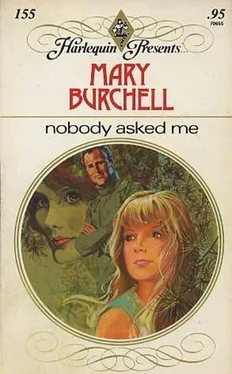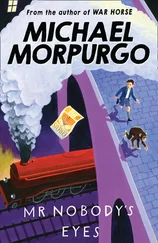Alison heard her give the very faintest, satisfied laugh. And she thought again, ‘I hate her.’ Then she realised suddenly that she felt slightly sick.
When the curtain rose again she saw nothing of what was happening on the stage. She was dunking, ‘It’s awful to feel like this. It’s wicked, in a way, because he belongs to Rosalie, and it’s no business of mine how much she hurts him.’
But she went on hating Rosalie.
Afterwards they went on somewhere to supper, and; although the party was a big one, Alison had some faint hope that she might have a further word with Julian, and perhaps find out what he had meant by that casual reference to ‘late nights’.
But when they reached the restaurant Julian was naturally firmly annexed to Rosalie’s group, and there seemed little likelihood of Alison’s being permitted to join them.
Instead, she found herself marooned beside an elderly retired colonel whom she had heard someone describe rudely and audibly as ‘very Poona ’.
It seemed he was ‘somebody’s uncle’, but the nephew or niece in question appeared to have left him to make his own amusement. Alison felt sorry for him, particularly as he looked a bit lost and offended after the Poona remark.
She tried, a little timidly, to make conversation with him, but although he seemed grateful, it was rather hard going.
He said, ‘Most extraordinary,’ almost every time there was a burst of laughter at any of the cabaret jokes, and once or twice he asked Alison to explain things that were best left unexplained.
She struggled along bravely, however, knowing from bitter experience how blighting it was to be ignored and cold-shouldered by these people. She guessed that the colonel was sufficiently near the category of ‘rich relation’ to be given a duty invitation to a theatre party, but that to show him a little personal politeness and consideration was beyond the limits of trouble to which his hopeful heirs would go.
Alison by now had taken the full measure of the world to which her aunt and Rosalie belonged.
Once the colonel said, ‘You ought to be dancing with the young people, instead of sitting here talking to me.’
But Alison said hastily, ‘Oh, no, thank you. I’d rather talk, really.’ For, as neither her aunt nor her cousin ever took the trouble to introduce her to anybody at this sort of affair, she was usually humiliatingly free of partners.
Just possibly, of course, Julian would come over and ask her to dance, but, as it seemed to be one of the evenings when Rosalie was quite willing to be gracious to her fiancé, the probability was slight.
So instead Alison did her best to simulate a profound interest in the colonel’s reminiscences and his description of what this famous restaurant was like in the days when he was a subaltern home on leave in the twenties.
It was not the liveliest way of spending an evening, but she was extremely touched when it was time to go and he said to her:
‘Good night. I hope I shall meet you again. You’re a very nice child, and the first young person I’ve met with any pretensions to manners since I came home.’
It comforted her a little for not having spoken again to Julian. And, in any case, as she told herself again when she got into bed that night, it was certainly not for her to expect any special notice from her cousin’s fiancé.
The summer crept on in ever increasing heat. Airless and aimless.
Uncle Theodore was on the Continent, and quite often Aunt Lydia and Rosalie went into the country for the week-end. Very occasionally they took Alison, but much more often she was left behind.
Sometimes she used to tell herself that she preferred it so. The big house might be incredibly empty and lonely when she was left there by herself, but Aunt Lydia had a way of making her feel still lonelier if she came to any of the smart house-parties.
Alison tried not to think too much about it because she was afraid of losing her sense of proportion where her aunt and Rosalie were concerned, but she felt pretty sure that the uppermost idea in Aunt Lydia ’s mind was that no one should be allowed to detract from Rosalie’s social success.
And once or twice Alison had shown distinct signs of achieving a certain little popularity of her own.
It was after this that the invitations, as interpreted by Aunt Lydia, showed an increasing tendency to include only herself and Rosalie.
There was no appeal, of course, any more than there had been over the question of getting a job. And so Alison had to resign herself as best she could to large slices of her own exclusive company.
One Saturday, when she was quite alone, the telephone bell rang.
Alison took off the receiver.
‘Hello.’ She sounded more listless than she knew.
‘Mr. Tyndrum speaking,’ came Julian’s voice from the other end of the wire. ‘Can you tell me if I left my cigarette-case at the house yesterday afternoon? I have an idea I put it down on a table in the library. It’s a gold one, with the initials "J.T." in one corner.’
‘I-I’ll go and see,’ Alison said.
‘Just a moment.’ His tone changed suddenly. ‘Who is that speaking?’
‘It’s Alison,’ she said, and then wondered the next moment if she ought to have said ‘Miss Earlston’.
He didn’t seem to think so, however, because he immediately repeated her name with some pleasure.
‘Alison! I thought you were away. Why aren’t you with your aunt and Rosalie in Sussex?’
‘I-wasn’t asked.’
‘Weren’t you?’ The sudden gentleness in his voice made Alison bite her lip.
‘I’ll go and see if your case is there, if you’ll just hold on a minute.’
‘All right.’
She went into the library thinking, ‘And I didn’t even know he was here yesterday. It must have been when I went to fetch Aunt Lydia ’s rings from the jeweller’s.’
The case was there. She picked it up and held it rather close against her as she went back to the phone.
‘Hello. Your case is all right, I have it here.’ She suddenly pressed it absurdly against her cheek.
‘That’s good. I shouldn’t like to lose it. May I call in for it this afternoon, Alison?’
‘Yes-of course.’
‘Will you give me tea if I come about half past four? Or do the Victorian proprieties forbid it?’ She knew he was smiling.
‘I’ll have tea here for you at half past four.’
‘Good!’
When he had rung off, she stood there for a moment with the receiver still in her hand. Was it wicked to feel so happy at the mere thought of having him all to herself for perhaps a whole hour?
Of course it was. But what could she do about it?
He arrived punctually at half past four, and came into the library, where she was sitting rather solemnly behind her aunt’s small tea-table.
‘Well, Alison, this is very pleasant.’ He dropped into a chair opposite, and smiled at her as though he meant that.
‘Yes,’ said Alison. ‘Here is your cigarette-case.’ She handed it to him.
‘Thank you.’ He took it. ‘Why, it’s quite warm. Have you been holding it in case it should run away?’
‘No.’ She smiled gravely.
‘What then?’
‘I was just-holding it,’ she said lamely.
Alison was intent on pouring out the tea, so she missed the puzzled little look he gave her as he slipped the case into his pocket.
‘What have you been doing with yourself since I saw you last?’ he wanted to know.
‘Nothing very much,’ replied Alison with perfect truth.
‘Nothing? I thought you had become quite a popular young person-made your own set and that sort of thing. I understood that was why you were so difficult to get hold of.’
‘Did you?’ Alison slowly bit a piece of bread and butter, and wondered with sudden frightened misery if he were laughing at her.
Читать дальше












